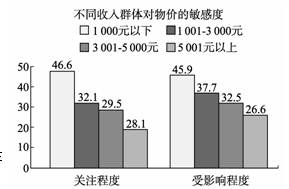在2010年“涨”、“炒”、“控”等财经热词,折射着大众的经济诉求,把握着经济生活的脉搏。回答下列各题。
小题1:由“豆你玩”开始,“蒜你狠”、“姜你军”、“糖高宗”、“苹什么”、“棉花掌”、“油你去”……相继袭来,让急中生智的人们变为“海囤族”、“抱团族”和“抠抠族”。炒豆、炒蒜、炒糖、炒房、炒金、炒茶、炒棉……只有想不到,没有炒不高。上述“热词”
①描述了物价上涨关系国计民生 ②揭示了市场调节的缺陷和弊端
③呼唤消费者应理智消费 ④警示生产经营者要诚信守法
A.①
B.①②
C.①②③
D.①②③④小题2:针对上题“热词”反映的经济现象,我国政府不断加强调控,打出一系列 “组合拳”。下列选项中均属于“组合拳”内容的是
A.增加货币发行量、实行“米袋子”和“菜篮子”负责制
B.增加储备产品投放、降低存款准备金率和企业所得税率
C.打击恶意囤积行为、提高人民币汇率和出口退税率
D.增加储备产品投放、提高存贷款利率和种粮补贴小题3:观察图,出现“不同收入群体对物价的敏感度”不同的主要原因是

A.物价高低决定着居民的消费水平
B.收入水平决定物价水平和消费量
C.消费水平决定物价水平和收入水平
D.收入水平决定消费水平,物价影响购买力
小题1:D
小题1:D
小题1:D
